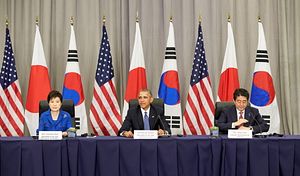With the election of Donald Trump, people have been raising questions about the future of U.S. alliances in Northeast Asia. The prospect of trilateral cooperation among the United States, Japan, and South Korea, which the three countries had agreed to in 2010, has become particularly uncertain. While the doubts about the unpredictability of Trump’s policy toward trilateral cooperation are warranted, what people might have missed is that South Korean domestic political change, especially its next president, will be even a more influential factor for the already strenuous issue.
Although candidate Trump had signaled some key redirections of U.S. policy in Northeast Asia during the campaign, he has largely backpedaled from these comments. For example, Trump, throughout the campaign, rebuked South Korea for not paying enough for U.S. troops stationed in South Korea. In fact, the South Korean government is paying about 50 percent of the total non-personnel costs of U.S. forces, according to congressional testimony by General Vincent Brooks. After Trump was elected president, he had a phone call with South Korean President Park Geun-hye and at least pledged his commitment to the solid alliance even though Trump is not satisfied with the cost burden of U.S. forces in South Korea. In addition, during the campaign, Trump advocated that South Korea and Japan develop their own nuclear weapons rather than relying on the U.S. nuclear umbrella. But after vehement criticisms, Trump denied such a position. Taking into account the views of the mainstream Republican establishment and the political reality, most likely, Trump will not bring about an abrupt and systematic change in the U.S.-South Korea alliance. After all, South Korea, the sixth largest trading partner of the United States, is indispensable not only to contain North Korea, but also to strengthen the U.S. role in Northeast Asia.
In reality, the future of the U.S.-Japan-South Korea trilateral cooperation will depend upon South Korea’s presidential election in 2017. Among three potential candidates, Moon Jae-in from the Minjoo Party — the main opposition party — leads in approval ratings, according to a Realmeter poll. Moon, who ran for president in 2012 but lost to President Park Geun-hye, is an experienced politician and has a positive reputation among the public. Though he has been criticized for his soft approach toward North Korea, Park’s political scandal has boosted his popularity over Park’s ruling Saenuri Party tremendously.
Moon’s Minjoo Party has a drastically different attitude toward the United States and Japan. Historically, it has criticized Saenuri for relying heavily on the U.S. alliance for security and for normalizing diplomatic ties with Japan. Former President Roh Moo-hyun, from an earlier predecessor of the Minjoo Party, once supported the withdrawal of the U.S. forces in South Korea. More recently, Minjoo rebuked Park for reaching the comfort women agreement with Japan. When the scandal-plagued Park signed the General Security of Military Information Agreement (GSOMIA) with Japan last week, the Minjoo led a campaign among other opposition parties to submit a motion for the dismissal of the minister of defense. Given its track record, a Minjoo administration in Seoul will block trilateral cooperation from becoming an institutionalized security mechanism.
For South Koreans, President-elect Trump seems to want to return to an isolationist path, recalling when Presidents Calvin Coolidge and Herbert Hoover were reluctant to engage in foreign alliances. However, the role of the United States in today’s world, as well as Northeast Asia region, is entirely different. Trump’s campaign rhetoric will be different from his actual policy. On the future of U.S.-Japan-South Korea trilateral security cooperation, the more serious challenge lies with South Korean domestic politics. While the conservatives are likely to bring cooperation further, a progressive government in Seoul will most likely disrupt its course. Hence, the fate of the trilateral cooperation hinges upon the result of the 2017 South Korean election.
Sangbo Park is an intern with the East Asia program at the Stimson Center and a fellow at the Asan Academy.

































